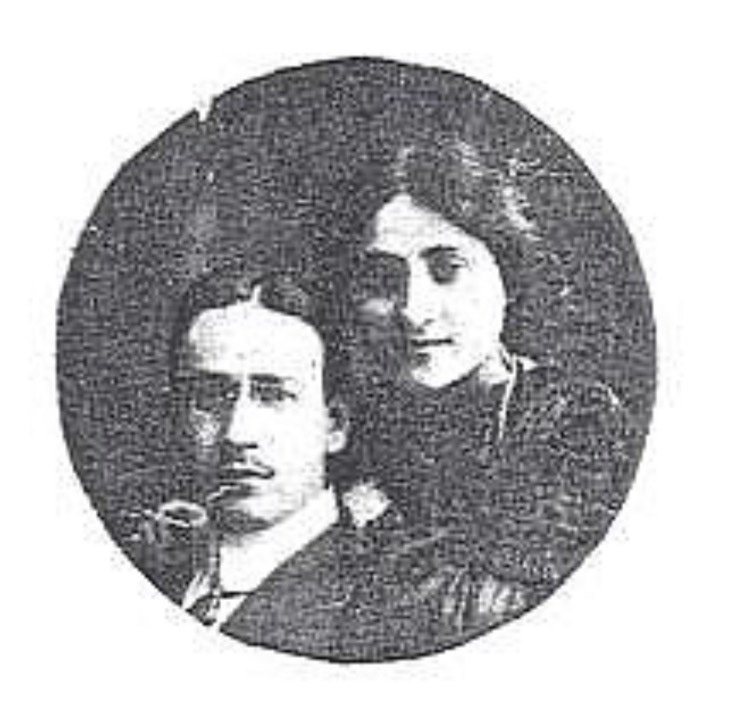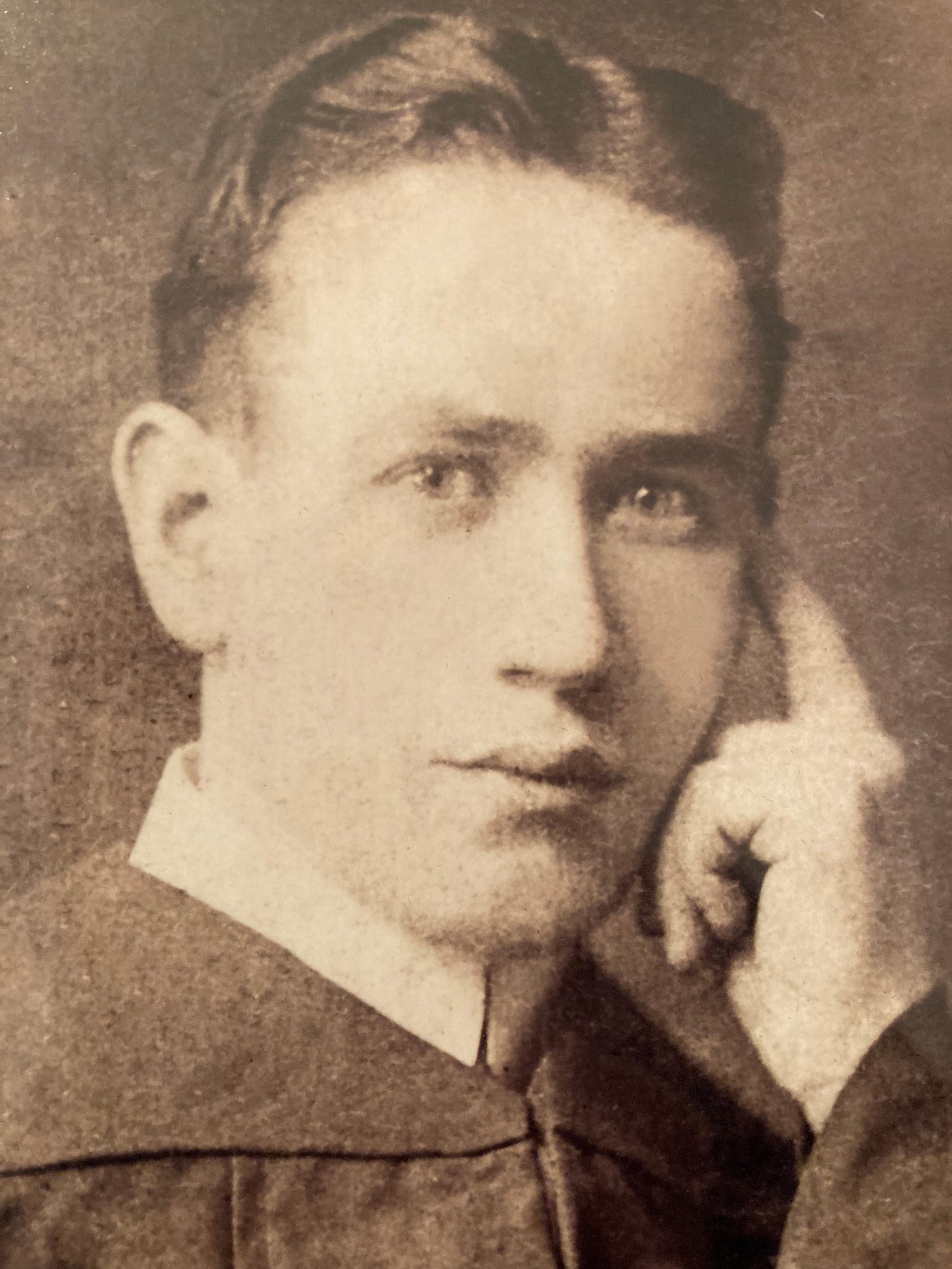Irving (Hal) Halpern was born in Warsaw, Poland in the late 1800s. As a teenager, he immigrated to New York City, where he met Jessie, my great-grandmother.
Together they created and ran two English schools. Hal also wrote a grammar textbook for his students, which he passed on to his children. Soon it’ll be ready to share with you, too!
My mom and I are putting Hal’s memoir into digital form by reading it out loud to one another. We record our meetings on Zoom and I use Substack to transcribe them.
I make the smallest of grammatical edits that I think Hal would approve of, had such technology existed when he wrote. (You can read more about the process at the end of this post, if you’re interested.)
Now, meet Hal!
Book One
September 7, 1910
Introduction
A number of years have rolled by, and the world has assumed a new aspect. I have in the meantime grown to maturity, but am still with the intention of beginning to keep a diary.
For the past 10 years, I have been longing for the opportunity of keeping what I will call a record of myself; but whenever I was on the point of commencing this important duty, which I thought I owed to myself, circumstances were sure to take a turn, and I would get neither the time nor the patience to carry out my plans. Sometimes, I thought to myself, “Well, never mind, there is plenty of time. Perhaps I ought to leave it until I become a man.” But I was simply cheating my own desires by saying so, and inwardly, I continued to yearn for the time when I would be able to put pen to paper and as it were, exhaust myself in ink.
I must admit that my putting off this matter is perhaps traceable to my neglect, and I often think that the fault is with me. But in truth, my past days have been so overcrowded with ordinary deeds of study and labor that I hardly had time for my meals, or for a quiet hour of reflection. Yet in spite of all this hustle and bustle, I am under the impression that, had I spent my energy and willpower upon it, I could have accomplished it, even though at a great sacrifice of sleep and rest.
Even now, I am not in a position to look forward to any leisure time, but snatching the little opportunity that I have now, I have decided to make the start. Once begun, I am determined, in the future, to sacrifice either my sleep or rest in order to keep this record.
In order to do justice to myself, I must put down two main reasons which have, of late, acted as a stimulus to the execution of my early desires.
One reason lies in the general purpose and usefulness of such a record. The second is a particular incident of great importance, which marks a turning point in the history of my life.
a) As to the first, there is a great deal to be said. I have often thought of the relation between the history of a nation and a diary. One is the history of a group of people, the other that of an individual. In the early days of history, no people ever put down any record of itself, and that is why we have what is called a “Prehistoric Period,” i.e., a period in which, through lack of ability and desire, people did not dream of keeping a record of themselves, and their deeds.
As time advanced, with the development of the races, more and more attention began to be paid to recording every fact and event, until it became an absolute necessity for every country and nation to keep a close eye upon itself, so to speak.
The object and the wisdom of such a record is easily seen. History, in a broad sense, is the record of past experiences. It is the book in which we find people's successes and failures, people's trials and hardships, together with their triumphs over them. In it, every nation finds valuable lessons for itself. We can judge the present by the past. It is the text book for all governments and, if well observed, a guide to all their affairs.
Now, not only do nations see the wisdom in tracing their deeds and activities in the annals of history; but all large social organizations down to the smallest societies and clubs keep records of their progress. This history is their lesson book, and marks their gradual development through a variety of acts.
Following up this thread of reasoning, I must come to the conclusion that a diary is just as important to every individual as history is to every nation and organization.
The history of a nation recites the progress and development of the people, while a diary recites the progress and development of an individual.
Just as a nation should profit by its past experiences, so every individual should endeavor to profit by those of his. The diary forms his textbook of life. It contains the steps which mark the progress and sometimes the retrogression of his mind and body.
How valuable would it be for each one of us to write — so to speak — the history of himself! How much pleasure could one derive from reading in later years one’s gone-by experiences and seeing them vividly in his mind and being able to put his finger upon the various periods in his life or stages in his development, which were the stepping stones to his or her success. It seems to me that both in successes and failures, a record of oneself is of great importance. Should it be a successful life, it is valuable and pleasing to have a record of its progress. Should it be an unsuccessful one, it is valuable for the suggestions and innumerable advice which it is bound to give for the future. In either case, we can profit a great deal by the lessons which our past experience teaches us.
It may be argued that there is no need of such a personal record. That the mind is a “sufficient” instrument to record all events. But the mind is comparatively weak in memory. Facts are almost erased and wiped out of existence after a long time has gone by. It is true that every experience in our lives impresses upon us, but the impression is vague and hardly realized in later life. By recording the daily events, we would simply aid our mind in its development and we would be sure to gain the most out of each experience.
So much for the general reason which prompts my keeping a diary. It may perhaps be called conceit or a sort of unusual estimation of oneself or any other unpleasant name. But surely nations are not considered conceited or haughty, because they keep records of themselves. I want to keep this diary in order to watch the steps in my course of development, and as I grow older, to be able to turn back upon these pages and read in them the various causes and effects of certain experiences which have made me what I am.
“Life,” we say, “is the best school.” This shall therefore be the book of my life and therefore the school of my life.
A note on my transcription/editing process:
I made a few tiny grammatical corrections that I think Hal would have welcomed. I then asked ChatGPT to find any typos or grammatical mistakes I missed. I took of ChatGPT’s suggestions and ignored others, making a few more minor edits.
This is the first time I have used ChatGPT in my blog posts.
I will ONLY use it as a grammar-editor and spell-checker to help me bring Hal’s words into digital form.
While we’re on the subject, let me be very clear that I DO NOT use ChatGPT to help me write or edit my blog posts, or to give me ideas about what to write about.
I run my blogs through Google Docs to check for typos and spelling before posting.
This won’t change. And I think it’s important that you know!
Until tomorrow!!!






